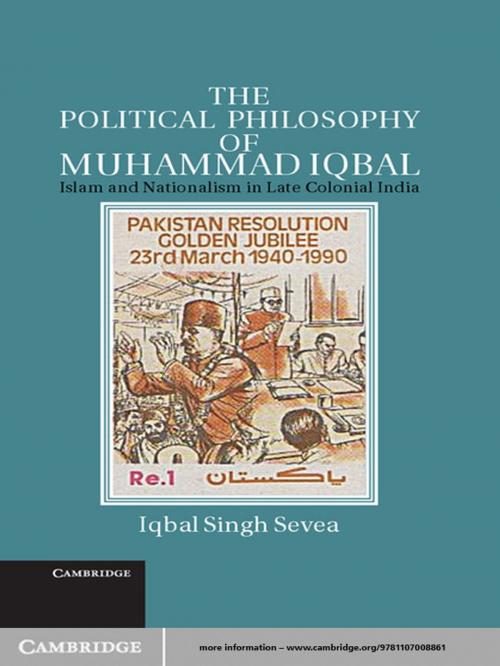The Political Philosophy of Muhammad Iqbal
Islam and Nationalism in Late Colonial India
Nonfiction, History, Asian, India, Religion & Spirituality| Author: | Iqbal Singh Sevea | ISBN: | 9781139411356 |
| Publisher: | Cambridge University Press | Publication: | June 29, 2012 |
| Imprint: | Cambridge University Press | Language: | English |
| Author: | Iqbal Singh Sevea |
| ISBN: | 9781139411356 |
| Publisher: | Cambridge University Press |
| Publication: | June 29, 2012 |
| Imprint: | Cambridge University Press |
| Language: | English |
This book reflects upon the political philosophy of Muhammad Iqbal, a towering intellectual figure in South Asian history, revered by many for his poetry and his thought. He lived in India in the twilight years of the British Empire and, apart from a short but significant period studying in the West, he remained in Punjab until his death in 1938. The book studies Iqbal's critique of nationalist ideology and his attempts to chart a path for the development of the 'nation' by liberating it from the centralizing and homogenizing tendencies of the modern state structure. Iqbal frequently clashed with his contemporaries over his view of nationalism as 'the greatest enemy of Islam'. He constructed his own particular interpretation of Islam - forged through an interaction with Muslim thinkers and Western intellectual traditions - that was ahead of its time, and since his death both modernists and Islamists have continued to champion his legacy.
This book reflects upon the political philosophy of Muhammad Iqbal, a towering intellectual figure in South Asian history, revered by many for his poetry and his thought. He lived in India in the twilight years of the British Empire and, apart from a short but significant period studying in the West, he remained in Punjab until his death in 1938. The book studies Iqbal's critique of nationalist ideology and his attempts to chart a path for the development of the 'nation' by liberating it from the centralizing and homogenizing tendencies of the modern state structure. Iqbal frequently clashed with his contemporaries over his view of nationalism as 'the greatest enemy of Islam'. He constructed his own particular interpretation of Islam - forged through an interaction with Muslim thinkers and Western intellectual traditions - that was ahead of its time, and since his death both modernists and Islamists have continued to champion his legacy.















